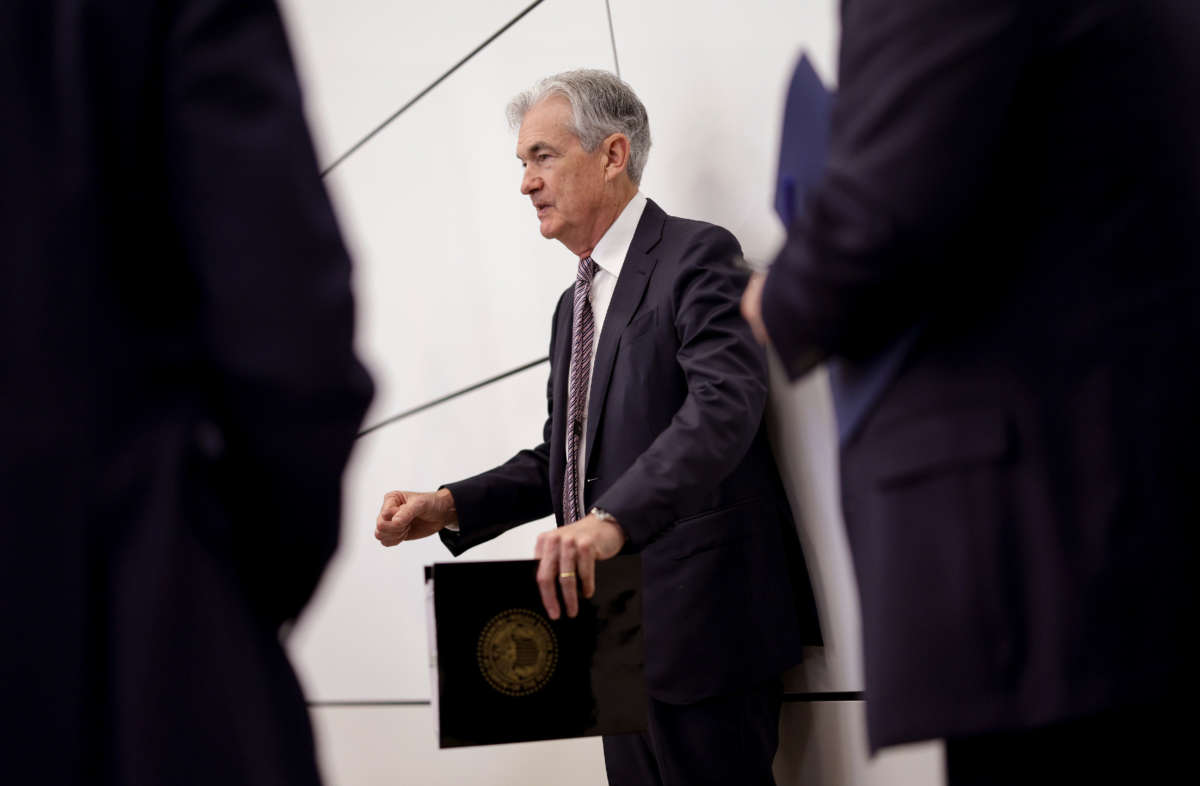Truthout is a vital news source and a living history of political struggle. If you think our work is valuable, support us with a donation of any size.
On Wednesday, at the end of a two-day Federal Open Market Committee (FOMC) meeting, Federal Reserve chair Jerome Powell announced a tightening of monetary policy in response to the highest U.S. inflation in 40 years. The burden of this measure will fall disproportionately on the working class, both in the U.S. and abroad.
In a press release the FOMC said the current inflation rate reflected “supply and demand imbalances related to the pandemic, higher energy prices, and broader price pressures.” The Fed raised its benchmark policy rate by 0.75 percentage points, the first increase of this magnitude since 1994. This raises the target range for the federal funds rate to 1.5 to 1.75 percent. The Fed will also “continue reducing its holdings of Treasury securities and agency debt and agency mortgage-backed securities.”
The Fed is maintaining the course it has adopted since the end of last year as a way out of the pandemic’s economic effects, reaffirmed this year by the Russia’s invasion of Ukraine, which has caused energy and commodity prices to sharply increase. These tightening measures have already caused a drop in U.S. stock prices, but the effects will go much further, harming the working class both in the United States and internationally.
The U.S. and International Working Class Will Pay the Price
At first glance, the Fed’s aim is to curb inflation — which sits at 8.6 percent — by cooling the economy. Higher interest rates strongly affect the working class, since they make credit more expensive, and it becomes more expensive to spend money, thus reducing people’s disposable income. Higher interest rates also often cause governments to impose austerity measures, since it becomes more expensive for them to borrow money.
In the United States, the Fed’s aggressive plan could also increase unemployment by discouraging investment and hiring. This would set the stage for lowering wages. Powell argued weeks ago that wages are rising too quickly and that the labor market is “tight to an unhealthy level” — in other words, employment is too high. But as we have previously argued, wages and employment are not to blame for the inflation rate.
In fact, inflation has been eating into real wages, part of a pattern of workers losing ground in terms of pay for several decades. Powell, of course, says nothing about growing inequality and sees no problem with billionaires enjoying explosive wealth growth during the pandemic while millions were plunged into extreme poverty.
To make matters worse for the working class, there are indications that the global economy is headed toward a new recession. The climate crisis and threats of famine add fuel to this fire.
The U.S. GDP composes 25 percent of world GDP, and the country has important trade relations with almost every country. For dependent countries in regions like Latin America, the Fed’s moves to curb inflation threatens to have serious international ramifications, exacerbated by an increasing subordination to the IMF.
For example, there may be slower economic growth internationally. The rate hike has already caused a decline in U.S. output prospects and could lead to a more sustained decline. This would put the same pressure on the rest of the world, endangering the jobs and incomes of millions of people, especially in the most fragile economies.
Increasing the interest rate also favors the movement of capital toward the dollar as a safe haven. This means that to dollarize, investors will reduce their holdings in local currencies, adding pressure on the demand for the U.S. currency. In fact, both the Brazilian real and the Chinese yuan have devalued by 6.3 percent in the last quarter, and the pressure on the Argentinean peso is growing. These devaluations can then cause price increases. The increase in the price of imports — both of final and intermediate goods — raises inflation in local economies.
Finally, the Fed’s moves can increase the cost of international credit. In other words, access to credit will be restricted, and the cost of foreign debts in dollars will increase. This raises the risk of default in some emerging economies, such as Argentina.
In this context, the Fed’s interest rate hikes aren’t just abstract monetary policy; they will reverberate far beyond the U.S. economy. And, as always, capitalists and their institutions are interested in self-preservation, stability, and continuing exploitation — workers and the poor, both in the U.S. and in dependent and semicolonial countries, will be forced to shoulder the burden of these measures. This means it’s more important than ever for the working class to organize to confront these attacks.
Originally published in Spanish on June 16 in La Izquierda Diario.
Translated and adapted by Otto Fors
A terrifying moment. We appeal for your support.
In the last weeks, we have witnessed an authoritarian assault on communities in Minnesota and across the nation.
The need for truthful, grassroots reporting is urgent at this cataclysmic historical moment. Yet, Trump-aligned billionaires and other allies have taken over many legacy media outlets — the culmination of a decades-long campaign to place control of the narrative into the hands of the political right.
We refuse to let Trump’s blatant propaganda machine go unchecked. Untethered to corporate ownership or advertisers, Truthout remains fearless in our reporting and our determination to use journalism as a tool for justice.
But we need your help just to fund our basic expenses. Over 80 percent of Truthout’s funding comes from small individual donations from our community of readers, and over a third of our total budget is supported by recurring monthly donors.
Truthout’s fundraiser ended last night, and we fell just short of our goal. But your support still matters immensely. Whether you can make a small monthly donation or a larger one-time gift, Truthout only works with your help.
